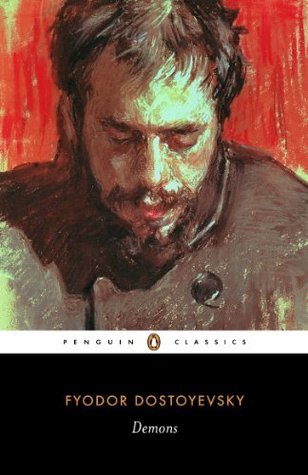More on this book
Community
Kindle Notes & Highlights
‘A frost is coming,’ Semyon Yakovlevich intoned.
‘please do get down, I really want to see you kneeling. If you don’t get down, then don’t come to visit me any more. I really want it, I really do want it!’
Mavriky Nikolayevich would interpret these capricious outbursts of hers, which had become particularly frequent of late, as flare-ups of blind hatred towards him, not because of malice — on the contrary, she esteemed, loved and respected him, and he knew it himself — but because of a particular kind of morbid, unconscious hatred that she couldn’t control at times.
‘Get up, get up!’ she was screaming like a woman possessed.
‘Comelylooks, comelylooks!’ Semyon Yakovlevich repeated once again.
Thus ended our trip to Semyon Yakovlevich.
Filled with love so true, True to a delicious dream…
It's the poem that was so important in The Idiot, the one Aglaya recited somewhere in Part 2 after Myshkin recovered from his seizure to say that Myshkin is in love with Nastasya. Stepan Trofimovich seems to think that he's the poor knight - he isn't, though he may venture to be now.
Stepan had
The poor lady immediately became the plaything of all sorts of different kinds of influences, while at the same time imagining herself to be entirely original.
That's why she was so easy for Pyotr to manipulate. She is those people who want so badly to be original and independent, and choose nihilism in their path.
And the utter chaos that resulted in the guise of independence!
Pyotr Stepanovich helped this strange idea lodge itself firmly in her mind.
the director of the Shpigulin factory had delivered to the police two or three bundles of leaflets that were identical to those found on the second lieutenant, which had been dropped at the factory at night. The bundles hadn’t even been opened, and none of the workers had had a chance to read a single one.
Remember that the seedy, cholera-stricken Shpigulin factory is now in possession of manifestoes that they hid from their slavelike workers :3
it’s all these unpleasant things,’ he grumbled
this poem is his, his own creation and it was printed abroad through him.
‘I know nothing, I know nothing, nothing at all. Adieu. Avis au lecteur!’
Pyotr clams up when asked about Stavrogin. He probably truly is uncertain about where he and Stavrogin stand with each other now. By the way, now the narrative has switched to showing the story through Pyotr's eys and the setting has just altogether switched back to the one we saw in Part I. Stavrogin's point of view was a jarring change of setting from the high society to the underground, where he spent all of his time.
Whether he actually understood Andrey Antonovich’s last hysterical outburst as explicit permission to do what he was asking, or whether he had bent the truth in this case for the immediate good of his benefactor, utterly convinced that the end crowns the work — in any event, as we shall see later, this conversation between a superior and his subordinate gave rise to something totally unexpected, which made many people laugh, received publicity, stirred fierce anger in Yuliya Mikhaylovna, and in all these ways utterly disconcerted Andrey Antonovich, throwing him, at a most critical time, into a
...more
Holy Russia is a country made of wood, poverty-stricken and… dangerous, the country of vainglorious paupers at its highest levels, and where the vast majority live in wretched little huts on hens’ legs.
Karmazinov's whole speech serves the purpose of speaking the thought of the Westerniser authors and thinkers of the time.
I could be useful if I killed myself, and that when you cook something up here and they start looking for the culprits, then I’ll suddenly shoot myself and leave a letter saying that I did it all, and so it’ll be a whole year before they can suspect you of anything.’
if she were to be standing at the very altar under the crown, and you were to call her, she would abandon me and everyone else, and go to you.’
The crown in Orthodox weddings is very symbolic. This really ties in with Stavrogin's conversation with Dasha; he knew Liza would ruin herself for him and he is so depraved that he will want to see it. Feeding his moral carnality.
Until now I could never have imagined all these “metamorphoses”.’
Metamorphosis is somewhat important to how these people progress within the narrative. The whole story is about a revolution; a turning; metamorphosis. It has been a pattern that Stavrogin is a catalyst for these metamorphoses: Shatov and Kirillov, Pyotr (he frames Stavrogin as the international founder of their revolution and very well may truly think of Stavrogin as that), and the three women Stavrogin has associated with.


